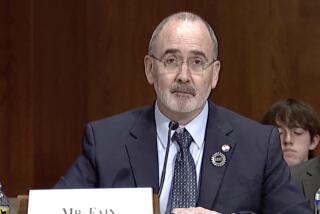Bring back the 40-hour workweek -- and let us take a long vacation
IT WAS A GREAT YEAR for labor — if you worked at a call center in India, made your living as a CEO or sold real estate to big-box stores. But deep in Cubicle Nation, the average American worker remained on a fast track to the Industrial Revolution, with soaring workweeks, declining wages and health, pension and vacation benefits vanishing faster than you can say job security.
Add to the siege outsourcing, cutbacks, the dismantling of ergonomics rules and forced overtime — all while business is racking up historic profits — and even a nearsighted dingo could see that the trends are unsustainable for families, personal health, company medical plans or an informed and involved citizenry. And completely unnecessary.
As all the productivity research shows, we can get the job done without finishing ourselves off. So let’s fire some of the worst habits that got us here and ring in resolutions for a “Sane Workplace in 2006”:
Restore the 40-hour workweek. Almost 40% of us are working more than 50 hours a week, not exactly what the Fair Labor Standards Act intended when it set the 40-hour workweek in 1938. Chronic 11- and 12-hour days result in lousy productivity, expensive mistakes, burnout, triple the risk of heart attack and quadruple the risk of diabetes — and families without a quorum for dinner. Two-thirds of people who work more than 40 hours a week report being highly stressed. Job stress costs American business more than $300 billion a year.
Establish rules for e-tools. The e-invasion is burying us alive. Human resources departments and individuals need to set tough-love boundaries that would determine message urgency, limit reflexive responses and establish no-send zones (i.e., no forwarding of multi-forwarded e-mails and absolutely no work e-mail at home or on vacation).
Give face time the pink slip. In the knowledge/digital ages, it doesn’t matter where your body is; what counts is inside your head. More telecommuting and flex schedules could save millions of dollars in office costs and hours reclaimed from gridlock, while providing workers much-needed flexibility, especially for time-crunched mothers.
Legalize vacations. Almost a third of American women and a quarter of men don’t get any vacation leave anymore because, unlike 96 other countries, the U.S. has no paid-leave law. Those who still get vacations seldom get to take the whole thing. The average American vacation unit in the travel business is now a long weekend. It’s barbaric. And myopic. Studies show that vacations improve performance on the job, not to mention cut the risk of heart disease and cure burnout. More than three-quarters of Americans say they would like to have another week off, which they’d get with the three-week minimum paid-leave law I’ve proposed.
Provide guaranteed sick leave. No one should have to lose a job because they get ill. But across this land, hardworking people are getting fired simply because their company has no sick days and they got ill. It’s time to join 139 other countries and protect those who can’t protect themselves with a minimum sick-leave law. The Healthy Families Act by Sen. Edward M. Kennedy (D- Mass.) and Rep. Rosa L. DeLauro (D-Conn.) would provide seven days of guaranteed sick leave.
Make Lou Dobbs secretary of Labor. The CNN anchorman’s dogged coverage of outsourcing and the forgotten middle-class worker has single-handedly kept the plight of wage earners in the public eye. He’s mad — why aren’t more of us? — and not going to take it.
Support a living wage. With the skyrocketing costs of gas, food and rent, an increase in the minimum wage is long overdue. Consumers need to support companies that pay a living wage, such as Costco, and shun ones that don’t.
Hold the back pats. This year, make a point of not supporting workaholic martyrs (“I worked all night! I came in on the weekend!” “Really? How lame.”) who don’t drive productivity but stress everyone around them.
Tighten the salary test. One of the main — and unacknowledged — drivers of overwork is the expanding definition of salaried employees. When the Fair Labor Standards Act codified the salary designation, it was intended to apply only to top administrators and managers. Over the last two decades, the classification has been stretched to include more and more of us, particularly after new, elastic rules by the Bush administration that could turn everyone from chefs to preschool teachers into salaried workers. In addition, hundreds of thousands of hourly workers, from burger flippers to insurance adjusters, are misclassified as salaried. The explosion of salaried employees — now 40% of all workers (including a huge jump in salaried caregivers) — is without doubt having major repercussions on divorce rates, child care, civic responsibilities and drug sales. Wake up and smell the Paxil.
Provide paid childbirth leave to all working Americans. Family values start here. Only 40% of American workers are eligible for the 12 weeks of unpaid leave under the Family Medical Leave Act, and fewer still are brazen enough to actually take the time off. There are 163 countries that offer paid family leave. The sterling bunch that doesn’t includes Papua New Guinea, Burkina Faso, Swaziland and the richest nation on the planet.
At a time when the people who make the products and services — without whom there would be no economy — are considered disposable, I’d like to see political candidates in ’06 do a head count and tally the number of disaffected wage earners desperate for leadership. This group includes not merely the 8% of private-sector workers who belong to unions but a vast legion of American Dreamers, including 70-hour-a-week video game programmers, biotech engineers and retail-sales moms pressed to the gibbering edge. One Republican pollster has found that lack of time is the No. 1 issue for young working mothers, more of a concern than Iraq and healthcare.
American workers have done their part, doubling productivity since 1969. How about producing a workplace worthy of them in 2006?
More to Read
Start your day right
Sign up for Essential California for news, features and recommendations from the L.A. Times and beyond in your inbox six days a week.
You may occasionally receive promotional content from the Los Angeles Times.






